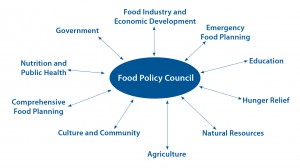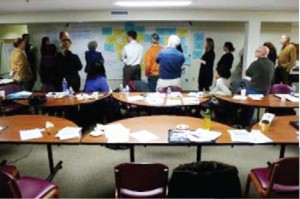The Food Policy Councils
April 24, 2013
Contributors: François Jegou (LE) and Serena Nardin
Workshop: Governance, synergies and local systems / Public policy involvement
The food policy councils are innovative collaborations between citizens and government officials which give voice to the concerns and interests of many who have long been under-served or un-represented by agricultural institutions.
As recently as a decade ago, food remained all but ignored at the city level. Unlike systems such as transportation, water, housing, and health, cities and their residents generally considered food as an issue outside the municipal agenda. Since the early 2000s, however, food policy has established itself as an important consideration for local government. Food systems are fundamentally linked to issues such as health, equity, environmental sustainability, and economic development, and the emergence of food policy programs over recent years reflect their value at the municipal level.
The goal of a food policy council is to enable the growing, processing and consuming of wholesome, tasty, nutritious food from local sources. Added value and alternative agriculture will be keys to restoring resilient communities and ensuring quality of life.
Main aspects of Food Policy:
- Food security and self-reliance (trust of citizens in the supply chain / production system)
- Sustainability (the citizens are aware of the impacts of food chains on natural resources)
- Health (malnutrition, obesity, allergies etc.)
- Fairness (the Fair Trade is growing responds to the needs of citizens in terms of equitable distribution of wealth)
Different cases of Food Policy Councils, even the British Food Policy let inspire by them:
- The London Food Board is an advisory group of independent food policy organisations and experts which oversees the implementation of The Mayor’s Food Strategy: Healthy and Sustainable Food for London.
- The Boston Food Council was established by Mayor Thomas M. Menino to ensure access to healthy food and expand local food sources for the residents and businesses of Boston and the region. The Council, composed of representatives from the public, private and non-profit sectors of the food industry, provides a broad range of expertise and resources to inform a city-wide food agenda.
- The Virginia Food System Council envisions a sustainable food system contributing to the health, economic vitality and social well-being of all Virginians by working to advance a nutrient-rich and safe food system for Virginians at all income levels, with an emphasis on access to local food, successful linkages between food producers and consumers, and a healthy viable future for Virginia’s farmers and farmland.
Environmental Benefits
- Increase access to healthy and affordable food
- Reducing the carbon food-print by reducing travel’s distance between producer and consumer
Economical Benefits
- Monitoring and managing production, distribution and consumption of local food
- Promoting food as an economic development strategy
- Expanding private and public partnerships
- Eliminating barriers that hinder or prevent local food purchasing by institutions
Social Benefits
- Developing strong relationship among all stakeholders of the local food system
- Improving the health through the consumption of local food
- Fostering local cohesion
Pro:
- Investing responsibility of public authorities, but also allowing the participation of citizens in the choices and responsibilities
- Educating the food system stakeholders how a sustainable food system has impacts on health, economic development, natural resources, and social well-being
- Building strategy, improving research and implementing networking schemes (Examining how food is produced, distributed, and consumed in the whole area, in order to expedite connections and identify barriers to improvement)
The food policy councils are innovative collaborations between citizens and government officials which give voice to the concerns and interests of many who have long been under-served or un-represented by agricultural institutions. They act as both “neutral” non-partisan forums in a food system and platforms for coordinated action and help local, regional, or state governments address in the food system challenges.
Food Policy Council models may share similarities, like their multi-stakeholders structure, but there is no unique model of Food Policy Council. Each council requires the involvement of specific actors that should reflect the unique local food culture and food stakeholders (producers, food industries, etc.). It should also respond to the specific agricultural policy needs and social, environmental and economical food-related issues.
It is said that Food Policy Council models are not unique because they depend on the area, the stakeholders involved, the local food culture, etc. What should they have in common and share?
What happens if the system of the Food Council gets too complex to deal with because of the variety of stakeholders involved? Will every decision and process get too slow for anything to happen? How do you manage to avoid that?
How to start a Food Policy Council? Can the URBACT LSG be a starter? What are the future perspectives of Food Policy Council and how should they evolve in time?

